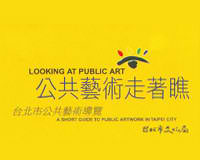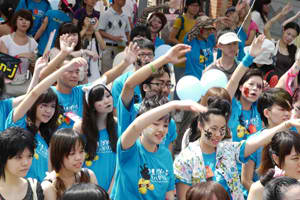Cultural Policy of Public Performance in Taiwan
by Yu-San Cheng
Street performances can be dated back to ancient times and are a phenomenon found around the world. In Chinese culture, street art has been a feature of everyday life for centuries. Performances have not been limited to a specific genre, or geographic location. Over the past few decades in Taiwan, street performances have become increasingly popular, drawing the attention of young audiences – and the government.
Historically, cities had limited open space for such ventures, and artists could only perform at underpasses, overpasses, storefronts, street corners, and the like. Artists were often penalized by the police or expelled by the owners of shops whose storefronts they occupied, and public opinion about street performers came to be quite negative and the development of public performance stalled.
In an effort to elevate the cultural quality of the country, the Department of Cultural Affairs lifted some restrictions imposed on street performers and began to cultivate a positive perception of such performances, even encouraging the idea that performances should not necessarily be free. Revised regulations were enacted in the year 2005, stipulating that any artist or ensemble is allowed perform in the city where they received a license. Each city designated public venues for these artists, granting space for those with a passion to realize their dreams and earn income while enhancing the community. Lawmakers viewed the new regulations as beneficial for both the artists and the government.
The new process creates the interesting situation where an artist auditions for a license. Each year, the Department of Cultural Affairs holds two license tests for artists, in May and November. A community audience and panel of judges review the tests, and the highest scorers are selected for licensing in three possible categories: performing arts, visual arts, and creative handcrafts. According to the Department of Cultural Affairs, a there are now nearly 800 street performance groups and individual performers who have been qualified to date in Taipei and there are 26 spaces in the city that have been made available for practicing. In reviewing the documents of street performers, we even find a few foreigners on the list. Most believe that the process of legalization and selection has greatly enhanced the quality of public performances in Taiwan and provides an excellent opportunity for promoting cultural exchange. Citizens and tourists alike have easy access to many different art forms from diverse cultures as they go about daily activities like commuting, shopping, and sightseeing.
Pros of Public Performance Policy
Blis-Sing, an a cappella group, has obtained a license to perform in Taipei, and they see several advantages of being licensed: no danger of being expelled from designated spaces, the opportunity to collect tips (which is after all, one of the main attractions for many artists!), a chance to expose art forms like a cappella singing to the public, the experience of testing new techniques and shows, and building a group’s image and brand. In addition, the arts are traditionally hindered by the lack of government grants and funding, so the opportunity to perform in public gives entertainers more chance of being discovered by talent seekers and production companies. The revenue generated from such “invited performances” provides support for necessities like hardware and equipment. Finally, for most of the street performers, their art form is not only a job. Passions and inspirations are realized through performing. Reactions, applause (and tips!) are the reassurances that motivate them to keep doing what they love.
Cons of Public Performance Policy
The cultural policy in Taiwan has appeared to foster the cultural richness of the country, but every policy has its detractors. Some wonder if it is suitable for the government to interfere with artistic freedom by attempting to regulate eligibility. While the pros to regulation include finding performers a legal place for performing and legitimizing their social image amongst the public, there is a flip side. Many believe the election procedure of the judges is not transparent enough. Judges with academic backgrounds may stifle artistic opportunities of cutting edge artists. Some have suggested evaluating the most experienced and popular street performers and having them serve as judges. Their firsthand experience would be valuable, and they would be more in touch with what works well on the streets. At the same time, others complain about the minimal entry requirements. Combined with the limited open spaces and time schedule, many performers feel that they still suffer from difficult competition. One proposed solution suggests that the government build a mechanism that attempts to select the “best product” for audiences by raising the application requirements or the judging standard.
Returning to the core issue, though: Does the government have the correct insights to select the most outstanding performers? And can the government decide what is best for the public? Who owns the power to judge the criteria? Public performers can definitely serve as catalysts for cultural improvement in any tourist city. They represent a culture and provide a first impression of a city. Ruling bodies have recognized this, and are taking advantage of these types of artistic performance. Though a completely state-run performance system seems unwise, the example that Taiwan provides might give us some insight into how infrequently considered artistic modes like public performance (whatever that performance may be) can truly enhance the places we inhabit and provide mutual benefit for artists and audiences.
For related articles from The Muse Dialogue:
Vol. 1, No. 7: Public Performance Table of Contents
Occupy Theater
Reference
Taipei’s Department of Cultural Affair s http://english.doca.taipei.gov.tw/
Taiwan Busker Development Association http://www.allstar.org.tw/star/












Trackbacks & Pingbacks